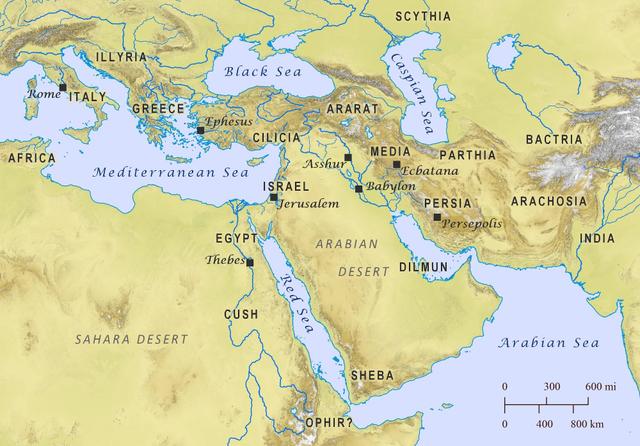If we understand who God is, we should live not only basked in His love, but in the fear of His might.
The Pauline Author refers to a placed revered by all Hebrews, Mount Sinai. But the Pauline Author makes it clear that we as believers, after the cross, stand before something much greater.
The mountain that can be touched refers to Mount Sinai, where the Ten Commandments were given to Moses, where the Old Covenant was established. This mountain was terrifying to the Israelites. It was a place so holy, that even animals were forbidden from touching it. It was a physical location, a mountain that could be touched in the sense that it was a mountain on earth. It was an intimidating place, surrounded by darkness and gloom and whirlwind, because it had the presence of a holy God.
When the Ten Commandments were given, the people of Israel experienced all kinds of terror, as we see in Exodus 20:18, “All the people perceived the thunder and the lightning flashes and the sound of the trumpet and the mountain smoking; and when the people saw it, they trembled and stood at a distance.” God’s presence, law, and anger were impossible for them to bear. They could not stand to hear God’s voice, and even so near to His holy mountain. But we who are believers after the cross have come to something much more holy, and with much greater terror.
In contrast to the terror of Mount Sinai, the Pauline Author says our Covenant, the mountain we draw near to, is Zion. Here, Mount Zion represents the heavenly Jerusalem, the place where God reigns. It is the very assembly of God and His angels that we are in the presence of, spiritually. One day it will come down to the earth physically, where Jesus will reign as King (Revelation 21:2). When the people expressed fear to Moses at Mount Sinai because they feared death, Moses told them not to fear death. Rather, Moses told them to fear sinning (Exodus 20:18-20). If we properly view God, it should lead us to fear the immense negative consequences of sin.
The people of Exodus 20 did not learn the lesson, and shortly after turned to worship the golden calf. As a result, that generation lost the reward of the inheritance. But we stand before a much greater mountain, so should have a much greater fear. Our potential loss is immensely greater than mere land on earth. We stand before a great cloud of witnesses, of the spirits of the righteous made perfect, and, God, the great judge of all. Between them stands Jesus, the mediated of the new covenant, who shed his blood for us. The Pauline Author says that the “sprinkled blood” of Jesus speaks better than the blood of Abel. Here, he is referring to Genesis 4, where Abel was murdered by his brother Cain, and his blood was “crying out” for justice. But Jesus’ blood speaks even better of both truth and justice than the blood of Abel.
But we have the ability to overcome in Christ. We have Christ, the better Priest and better sacrifice. We can go with confidence before the throne of God, as written earlier in Hebrews 4:16. But just as with Israel, we have a choice which way to turn. The Pauline Author is continually trying to encourage and empower his Hebrew audience to endure in this New Covenant. It is better in every conceivable way than the Old.
Biblical Text
18 For you have not come to a mountain that can be touched and to a blazing fire, and to darkness and gloom and whirlwind, 19 and to the blast of a trumpet and the sound of words which sound was such that those who heard begged that no further word be spoken to them. 20 For they could not bear the command, “If even a beast touches the mountain, it will be stoned.” 21 And so terrible was the sight, that Moses said, “I am full of fear and trembling.” 22 But you have come to Mount Zion and to the city of the living God, the heavenly Jerusalem, and to myriads of angels, 23 to the general assembly and church of the firstborn who are enrolled in heaven, and to God, the Judge of all, and to the spirits of the righteous made perfect, 24 and to Jesus, the mediator of a new covenant, and to the sprinkled blood, which speaks better than the blood of Abel.
Check out our other commentaries:
-
Colossians 3:9-11 meaning
Paul continues his description of behaviors that are not in alignment with the reality of Christ, or the true benefit of the Colossian believers, and...... -
Deuteronomy 33:26–29 meaning
Moses finished his blessings on each tribe of Israel with a blessing on all of them. Moses also exalted the God of Israel, the Protector...... -
Philippians 3:17-21 meaning
Paul tells the Philippians to imitate him, not other believers who are living contrary to Christ by serving their own immediate desires. They live lives...... -
Hebrews 10:26-31 meaning
If we abandon our faith and choose to live sinfully, we will get a negative reward. We will lose our inheritance in the future kingdom....... -
Exodus 39:27-29 meaning
The priests' turbans, caps, breeches, and sashes are made.......



